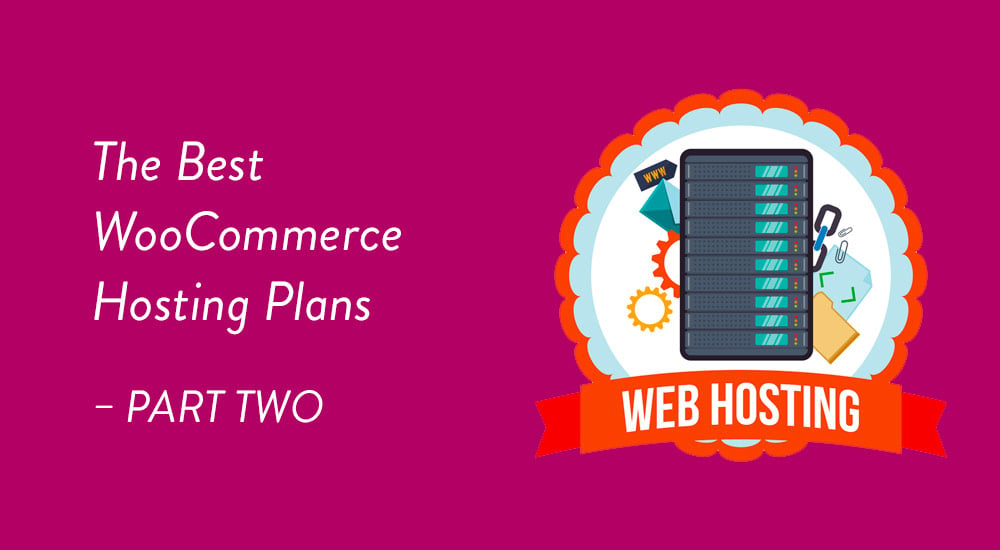In Part 2 of our Best WooCommerce Hosting Plans we take a look at the different options that you should give consideration to before selecting a hosting provider.
A brief primer on various hosting flavours
The first thing you must realize is that not all hosts are created equally. There are all sorts of different types of hosting providers that you should have a grasp of before making a decision as to where to host your eCommerce website. We’ll briefly explore each of these today.
- Shared WooCommerce Hosting
- VPS WooCommerce Hosting
- Cloud WooCommerce Hosting
- Managed WordPress and WooCommerce Hosting
- Dedicated Servers for WooCommerce
Shared WooCommerce Hosting
In Part 1 we pretty much ruled out shared hosts for WooCommerce. There are a tiny number of exceptions to this. We’ll come back to that a little bit later. To summarize what we touched on yesterday, with all types of hosting you pretty much get what you pay for. If some host is promising you unlimited sites, disk space, databases, domains etc. it’s pretty much nonsense to start with. You just go ahead and put a high traffic eCommerce website on one of those hosts and see what happens 🙂 If your site doesn’t crash (which it probably will) you will most likely get an email from your unlimited host telling you you’ve breached some acceptable use threshold and that you need to update to a more expensive hosting option. Safe yourself the hassle and avoid shared hosting for WooCommerce unless you’re prepared to live with the consequences.
VPS WooCommerce Hosting
The next level of from Shared hosting is a Virtual Private Server or a VPS as it is more commonly known. A VPS is definitely a big step up from a shared host. There are also different types of VPS packages which broadly fall into 2 categories:
- Managed VPS hosting
- Unmanaged VPS hosting
Nearly all shared hosting packages are effectively managed hosting packages where you have some access to technical support at the hosting provider when you run into trouble. With a VPS hosting package that isn’t always the case. Hence the differentiation between Managed and Unmanaged VPS hosting. Managed VPS hosting is a necessity for most people unless you have really well-polished server management skills. Unmanaged VPS hosting tends to be a good bit cheaper but then you are on the hook for all sysadmin tasks. Avoid this option unless you know what you’re doing.
Cloud WooCommerce Hosting
Cloud hosting is essentially the same as VPS hosting. We do treat it as a separate category as there are a number of hosting providers who we can group together into what would be considered true “cloud” hosting providers. Although nearly every hosting company on the planet has jumped on the cloud bandwagon and are rebranding all their hosting plans as cloud hosting plans. For our purposes, we will define pure cloud hosting providers to be large scale hosting providers who provide unique scaling capabilities through their own proprietary cloud platforms that have defined the industry rather than rebranding generic hosting plans. Cloud hosting is very appealing for merchants who have large seasonal traffic spikes. It means you can operate most of the year with reasonably cost effective hosting and then ramp up as demand requires during peak busy periods like Christmas.
Managed WordPress and WooCommerce Hosting
Managed WordPress hosting is a relatively new phenomenon compared to the other types of hosting included on our list. WPEngine pretty much pioneered the market but since then a plethora of really impressive competitors have emerged and I would now clearly classify this as a hosting category in of itself when we talk about WordPress and WooCommerce hosting. Managed WordPress hosting has huge benefits for WordPress site owners, in particular when it comes to site speed, performance and overall stability. Most Managed WordPress hosts operate highly tuned devops stacks that usually incorporate nginx, Varnish, Memcached amongst other tech to deliver superior performance. Again if you’ve got the skills there’s nothing stopping you from doing this yourself but trust me don’t even go there if you do not know what you’re doing. The disadvantages of Managed WordPress hosting primarily are down to cost and perhaps a slight lack of control over the fine tuning of your hosting environment. But these disadvantages may not really be disadvantages for those who value superior stability and performance.
Dedicated Servers for WooCommerce
The final type of hosting is generally the most expensive. Dedicated servers are what high traffic websites and applications HAD to use before some bright spark designed cloud infrastructure. Dedicated servers are machines 100% dedicated to you normally in a top class data centre. As a result, costs tend to be quite a deal more expensive than any of the other types of hosting on this list. In addition, it’s more than likely that anyone going the dedicated server route will also have access to technical resource to configure and manage servers. For the purposes of our later reviews we’ll not be spending too much time looking at dedicated servers. There really are very few reasons why someone would want to start an eCommerce website on dedicated machines in 2014 unless you need total control over your tech stack or are looking to compete with Amazon 🙂
I think for me the most interesting things are happening in both the Cloud and Managed WordPress hosting categories – which is where we intend to spend most of our time in upcoming reviews. Tomorrow we’ll briefly look at our preferred VPS hosting provider.
See you tomorrow!
Ahem – psst… tomorrow became 4 months 🙂 Part 3 is live – enjoy 🙂







 Best Image CDNs for WordPress
Best Image CDNs for WordPress BigCommerce Review: Is It the Right eCommerce Platform for You?
BigCommerce Review: Is It the Right eCommerce Platform for You? How to troubleshoot WordPress problems
How to troubleshoot WordPress problems Ajaxify your WooCommerce product categories
Ajaxify your WooCommerce product categories
Hi, we’re still waiting for your article on your “preferred VPS hosting provider”!
Hi there Taroc,
I know – so am I 🙂 Sorry for the delay – we went into lock down mode to get a new theme completed which we’re just about finished to we will be back to our hosting series very shortly.
Stay tuned!
I just found this post today.
I’m very interested to read the next parts of this post.
I’m building my store on my localhost and looking for a hosting solution now. I am using Woocommerce and my store is very small, ie, less than 50 products (including variations)
Hi Jay,
Next parts are being worked on as we speak 🙂
For smaller sites you can’t go wrong with Siteground – https://www.commercegurus.com/siteground.
Colm
Hey Colm, I highly appreciate the information and topic you discussed. It is really amazing to see that you are spreading awareness about the WooCommerce hosting. I represent Cloudways as Community Manager. We are a European Based Cloud Hosting providers with the integration of Amazon and DigitalOcean. We have our recipe of Nginx, Varnish, Apache and Memcache to optimizes the server speed. We have integrated a great number of apps like WordPress, Magento, PrestaShop, etc. Our users can install servers on Amazon or DO in one click with any of these apps.
Recently, we have seen a discussion on different forums and communities about the issue of Varnish Cache with WooCommerce. I’m super excited to inform you that our amazing dev team have finally solved this issue. We have added WooCommerce as an app at our platform. Users can now install Varnish compatible WooCommerce in one-click. It will not take much time to have the WooCommerce store on Amazon or DO. We are all in press. This is a big news from Cloudways. You can play with it from here here http://www.cloudways.com/en/woocommerce-hosting.php and I’m sure you would love to know more. I’m all available on different social channels for any query. 🙂
Hi Waseem – while your comment is a bit of a hard pitch for Cloudways and a little bit spammy I’ll allow it as I’m curious about Cloudways. Your platform intrigues me. You didn’t do very well in this comparison in November http://reviewsignal.com/blog/2014/11/03/wordpress-hosting-performance-benchmarks-november-2014/
I’m curious as to what benchmarks you’ve conducted in terms of WooCommerce performance on your platform. Is there any indication of how well your platform performs in terms of customer sessions and number of transactions per second?
I really want someone to put together a world class hosting solution for WooCommerce that customers can setup on their own DO/Linode/AWS account so I’m willing you to do this well 🙂
Well thank you very much for the approval. The comment was neither a hard pitch nor a spam and more of the excitement to have the best team with us who take challenges faced by the community and solves the issues. You or anyone can reach any of our representative and we are always there to kill the curiosity. 😉
We invited Kevin to test out our platform and compare performance against others. The reason our results weren’t as impressive was because Kevin launched the smallest DO server and AWS server (i.e. t2.micro), we aren’t complaining but our recommendations weren’t heard and let him do the tests.
Reason of making Varnish Cache compatible with each WooCommerce installation is to make sure that the customer sessions, number of transactions and each step goes with a rocket speed. You can check our load performance test results on our blog post. We launched WooCommerce with and without Varnish Cache. Results were stupendous. Varnish boosted the speed of WooCommerce store more than 100%. We have the same mindset as you. We have build the best platform for our customers to launch WooCommerce at AWS/DO in one-click. We have in our iterations to add more server providers very soon.
I invite you to test Cloudways platform yourself. Our team would love to know your feedback. Lets put our efforts together to give the best to the community. 🙂